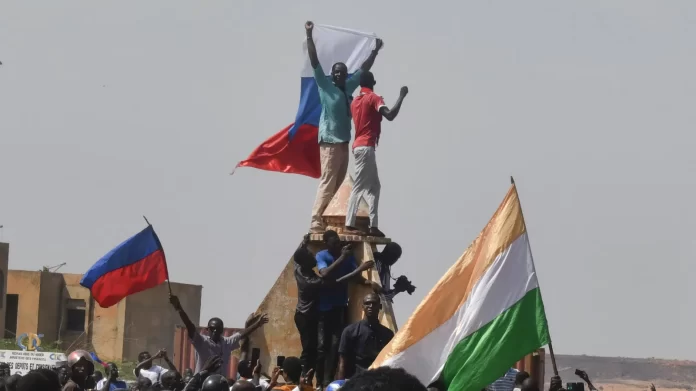International Condemnations:
Following the Niger coup, a number of concerns are raised internationally. The Economic Community of West African States’ (ECOWAS) joint suspension of ties with Niger, and the threat of possible use of force has come in hand with the withdrawal of British developmental assistance. It has also come with a warning from France that attacks on French citizens in the country will provoke an immediate reaction. However, given the ever-growing international fault lines in the region, the possibility of growing Russian influence must also be considered. The French embassy in Niger was targeted by pro-Russian protests on the 30/07–as claimed by The Guardian. Given the recent alignment of Mali, Guinea, and Burkina Faso with Niger following the coup–and Mali and Burkina Faso’s joint pledge of support for Niger’s defense against an ECOWAS intervention, it is important to consider the possibility of Wagner’s role in such a defense–particularly given their profound military role in Mali.
Wagner’s Potential Role:
Since Wagner’s march on Moscow in June 2023, it is not unreasonable to imagine that the group’s relocation may also come alongside lesser support from the Russian state. This will likely mean that Wagner will need to increase revenue generation, and a likely place to do so will be an increasingly unstable, and disjointed West Africa. Instability in nations such as Niger, Burkina Faso, and Guinea provide a great deal of opportunity for natural resource exploitation in exchange for Wagner’s military support. As has been noted by ACLED, the Wagner Group’s ability to efficiently suppress rebel groups in the Central African Republic (CAR) will make them an appealing choice for support in nations like Niger. Though it is worth noting that they have reportedly struggled to some extent in Mali.
Possible Domestic and Regional Perceptions:
At the time of writing, ACLED report a ‘limited change from average’ in regards to instances of political violence, this in spite of the coup. There have also been reports of protestors chanting Vladimir Putin’s name according to The Guardian, as well as actively denouncing France. Given a resurgence of Cold War-esque rhetoric coming from Russia regarding post-colonialism, and a continuous disappointment with French interventionism in West Africa, this is perhaps unsurprising. It would seem that in spite of Western aversion to the junta that has replaced President Mohamed Bazoum’s rule, it may be that the move is relatively popular within the country. However, it should be noted that this coup has been surprising to many spectators because there has been no discernible negative political or social changes of late.
In response to these changes, Chadian President Mahamat Idriss Déby Itno has volunteered to speak to coup leaders and reconvene with ECOWAS. Significantly, he has already met with ousted President Bazoum. Chad is a long term defense partner of France, and benefits from a strong bilateral relationship. Operation Barkhane was headquartered in the Chadian capital, N’Djamena, and Chad could be considered a linchpin of French military and foreign policy regarding the Sahel.
Conclusion:
As tensions rise between ECOWAS and this new collective of West African states, we may see a rise of Russian influence in the region, in response to a declining French influence. The long-term effects of which will almost definitely see a refreshed form of strategic extraversion on the continent.


